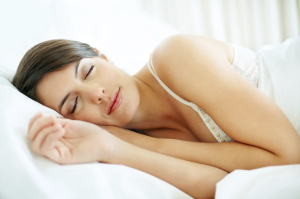Sleep Necessities
The magic ‘drug’ that keeps you happy, makes you skinnier and helps you be a better you
BY PEGGY J. NOONAN
Sleep. It’s as important to our overall health as diet and fitness but most of us take it for granted.
In fact, it’s tempting to skimp on sleep when we’re short on time and long on to-do tasks. We stay up late, wake up early and try to fit just one more thing into our day. And while that may be OK once in a while, we’re setting ourselves up for major health problems if we make it a habit.
Until recently, experts thought nothing much happened while we slept, but we’re now learning that sleep actually plays an important role in our physical and mental health.
Research has found that insufficient sleep is linked to a broad range of health problems, including diabetes, obesity, depression, high blood pressure and other cardiovascular diseases, a weakened immune system, even shorter life expectancy. It has been shown to lower the potency of vaccines and has the same effect on grade point average as binge drinking and marijuana use in college students.
Good sleep habits regulate mood, improve concentration and decision making skills and help people engage in work and social activities, says Larisa R. Wainer, a sleep disorder specialist with the Morris Psychological Group in Parsippany, N.J. “Even one night of sleep deprivation can cause a significant increase in symptoms of anxiety (and) depression in people who don’t have other mental health issues,” she says.
Got enough ZZZs?
So how much sleep do we really need?
For most adults, the target is seven to nine hours each night. People who sleep fewer than six hours a night have “a very high incidence” of health problems such as diabetes, cardiovascular disease and obesity, says Dr. Robert S. Rosenberg, a sleep medicine specialist at the Sleep Disorders Center of Prescott Valley, Ariz. “Six hours seems to be the ‘break point’ for a lot of physiological problems,” Rosenberg says. What about people who claim to be fine on just three or four hours of sleep a night (and imply the rest of us are slugs who sleep away the hours)? Rosenberg says studies show that no more than 1 percent to 2 percent of people have the “genetic determination” that allows them to need less sleep. The rest of us must have at least six hours or more. His advice: “Budget time to get a good seven to nine hours of sleep a night.
Naps not enough
And don’t rely on naps to accumulate your daily total. “That’s not good enough,” Rosenberg says. You may get your target hours, but fragmented sleep can disrupt your circadian cycle, the body clock’s natural cycle of sleepiness and wakefulness.
When people lose their circadian timing, they’re “miserable,” Rosenberg says. They’re up when everyone else is asleep and asleep when everyone else is up. It’s difficult to live a normal life when “they’re sleeping like a baby, two hours here, three hours there, then they’re up for two.”
If you’re tired in the afternoon and need a pick-me-up, aim for a short (20 to 30 minutes) nap, as longer naps can cut into that night’s sleep.
And don’t try to make up for lost sleep on the weekend, Wainer says. While taking a nap or going to bed early and getting up later once in a while can be fine, it can lead to trouble if you do it consistently.
When tired’s not normal
If you’re getting enough sleep at night, “you should not be tired” or feel run down, says Wainer. If you don’t feel as rested as you should, you may need to see your primary health care provider.
The problem could be something simple, such as a medication that’s keeping you awake. Or it could be a sleep disorder, something such as sleep apnea or insomnia. If your primary care provider doesn’t take a good sleep history or just puts you on a sleep medication, “you probably should go somewhere else,” Rosenberg says.
Keep a sleep diary or log for at least one week to track what time you went to sleep, when you woke up, how long it took to fall asleep, how many hours you slept, whether you napped during the day, consumed caffeine or alcohol, and so on. A log is much more accurate than memory, Rosenberg says, and will be “of the utmost importance” in helping your primary provider or sleep specialist determine what’s going on.
“Sleep health, especially for women, needs greater attention,” says Christine Carter, vice president of scientific affairs for the Society for Women’s Health Research.
We need to know more about the various biological, environmental and social factors that cause men and women to sleep differently, Carter adds, “so we can tailor better lifestyle recommendations and medical treatments to account for those differences.


